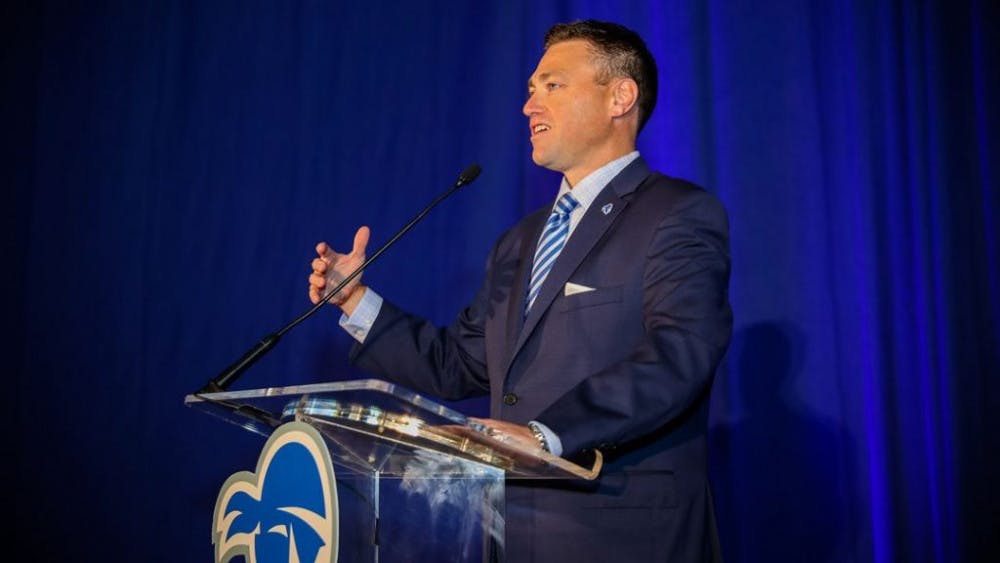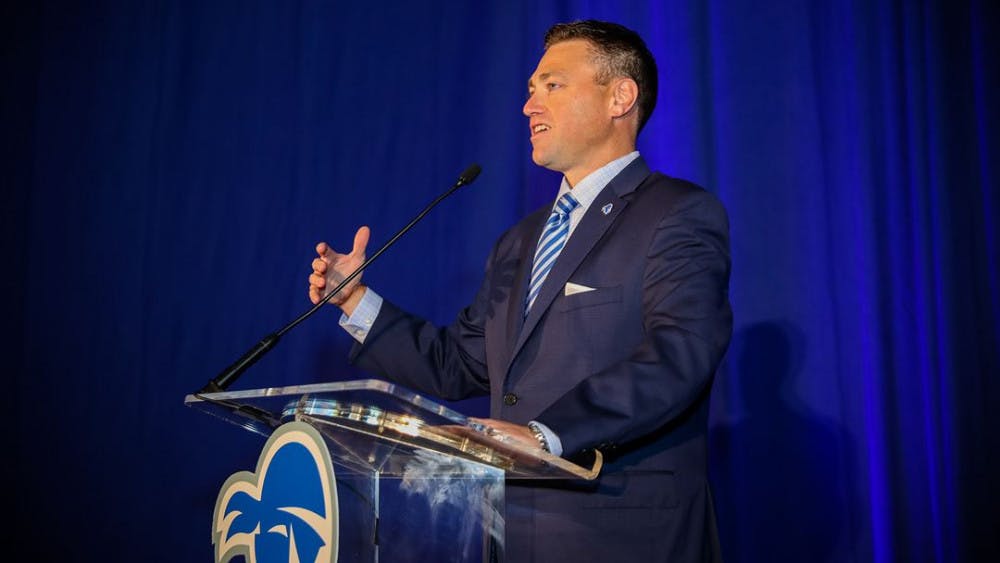In his first year as Director of Athletics and Recreation at Seton Hall, Bryan Felt went through a rollercoaster of experiences and unprecedented issues to deal with. An alumnus of Seton Hall, Felt joined the athletics department as director after serving in the same role for the past two years at St. Peter’s University. He had previously worked within the Pirates’ athletics department as Associate Athletics Director for External Affairs and later as Senior Associate Athletics Director. We caught up with Felt to see how he was adjusting to life in quarantine and to recap the events of his first year back at Seton Hall.

This interview has been edited for clarity.
JUSTIN SOUSA, Sports Editor of The Setonian: When you were deciding whether to leave St. Peter’s to become Seton Hall’s Director of Athletics & Recreation, why did you feel ready to take on the role?
BRYAN FELT, Director of Athletics and Recreation at Seton Hall: Seton Hall’s always been such a big part of my life. I felt like my 16 years at Seton Hall definitely prepared me in terms of being a Seton Hall person. Having the institutional knowledge, knowing our programs well, knowing our personnel well and knowing what it took to be really successful at Seton Hall. Those two years at St. Peter’s were the most incredibly valuable in my life, career-wise, because I got the opportunity to run an athletic department and make a lot of big decisions.
JS: In those two years with St. Peter’s, what was the biggest takeaway that you brought with you to Seton Hall?
BF: I learned a lot about myself as a manager. When you are the person that the entire department reports to, that’s a lot of weight. I realized the importance of transparency and having a unified group that works together. We had to really change our culture at St. Peter’s, and I think we did that, and I really give credit to the people I worked with for that. I learned the importance of the right fit and how important it is to hire the right people for your organization.
JS: What are the different challenges that come with working with programs at Seton Hall that are more successful compared with those that need improvement?
BF: One of the first things I did was sit down with every head coach. I knew where they were in their dynamic and their progress, but we have some new coaches in their first or second year here. [Programs] that are still continuing to work spend a lot of time talking about what kind of pieces they’re putting in place to build the culture that they want and to bring in the right players to fit into that culture as opposed to a coach that has already established a culture and continues to find ways to build on that.
JS: You mentioned culture a few times with St. Peter’s and now with Seton Hall. To you, what exactly is culture and what defines the culture you want to build here?
BF: I think culture is everything. I think if you have a poor culture, you will suffer in several ways. If you have made the choice to work in college athletics, you are committed to it. It’s a career that really becomes part of your personal culture and the life that you live. We work in athletics, and athletics don’t happen between 9-5. They happen at night and on the weekends, so it becomes a part of your family. I’m not available a lot at night and on weekends, and that’s the same for my staff. I think the culture of making sure that your workplace has the semblance of a family is very important. I want to make sure that people feel they are valued and they are important and that they can always come with a problem, bring up a topic, or make a suggestion. We want to make sure that there’s always comfort that they can do that.
JS: A few months into your first year as AD, you were slammed with a big problem in Kevin Willard’s suspension. How did you personally handle the situation and what was your process in creating a plan of action to get through it?
BF: It was all communication. Communication to make sure everyone was on the same page and that the message was the same. That was the most important thing. This was something that had external pieces to it, and I think we handled it as best as possible. We worked closely with the NCAA to make sure everything was done the proper way. We were upfront and had solid communication on how this would all transpire.
JS: What were discussions like in the athletic department when the university began to respond to the impending spread of COVID-19 throughout the country?
BF: I was involved in conversations from the get-go [with the university and NCAA]. This all happened surrounding basketball tournament time, and we just started to see dominoes fall. You saw Wednesday morning heading into the Big East Tournament, we decided to play with no fans. Then something happened with the NBA that night, and we held a meeting for the Big East that night and then again Thursday morning to cancel [the tournament] as many did. We’re all dealing with something that no one really has experience dealing with. The word “unprecedented” is probably used nauseatingly now, but that’s right on the money.
JS: How difficult was it to have those conversations with senior athletes who didn’t have the opportunity to see out the entirety of their final year at Seton Hall?
BF: It’s heartbreaking. Our student athletes have done such an amazing job at understanding and dealing with this situation. At the end of the day, it’s sports and it’s athletics. At the end of the day, it’s about the well-being of our students and every human being. We don’t make light of that, and there are larger things going on in this world like the heroism of our front-line heroes and our healthcare workers. It is crushing though. Any time you dedicate yourself to anything like a student athlete dedicates themself to their sports or academics, it’s crushing to have it taken away from you. What you see from guys like Myles Powell on social media talking about how necessary it was to do this, but it still hurts. You take your golf teams, your baseball, your tennis and your softball, you were preparing for a year to get to the spring. For seniors, they spent their entire lives working to be a division one athlete and this was their final moment.
JS: How did the athletic department continue to provide academic support for student-athletes during online classes?
BF: Our academic advising staff has been tremendous. Within the first week of being home, we put together our wellness program to figure out how we could connect with our student athletes during this time. Our coaches are doing wellness checks and checking in on their players, but our academic staff has been doing a great job at tutoring students remotely as well.
JS: How has the athletic department handled the issue of not being able to bring prospective student athletes onto campus for formal tours?
BF: Thankfully, we’ve put together a lot of footage that we had filed away. Our communications department did a great job of putting together virtual tours for our recruiting needs. Coaches could talk to recruits as they walked through the virtual tours with the students. We’re still trying to find new ways to adapt to recruiting, but I think we’re doing a great job.
JS: What’s the department’s plan of action in terms of dealing with the financial burdens this pandemic has placed on the athletics department?
BF: We’ve been making some very difficult decisions. We had to furlough a portion of our staff, and that’s not an easy thing to do. Unfortunately, a lot of the jobs people have to do just can’t be done at home, and that was part of thinking behind these decisions. We are hopeful that we will all soon be back and the people who are on furlough can come back as well.
JS: Having worked within the athletic departments of St. Peter’s and Seton Hall, do you have a favorite coach or player that you’ve worked with?
BF: There are so many. Early on in my Seton Hall career, I got to work with legendary coaches. I always loved Manny Schellscheidt. Mike Sheppard is one of the all-time greats, and I always adored Mike. When I first came back to Seton Hall, I got to work with Richie Raegan. I cherish those times working with the likes of Schellscheidt, Sheppard and Raegan. Those three come to mind because they’re coaching legends.
JS: Let’s say you’re at Seton Hall for at least 10 years. What does success within the Seton Hall athletics department look like to you 10 years from now?
BF: I want to continue graduating the best and brightest student athletes like Seton Hall has been doing. I want to continue building and sustaining a successful men’s basketball program like we have been doing right now because it’s important to our university. I’d love to see that for both our basketball programs. I’d also love to establish traditions of success within individual programs. Some of them already do, but I’d like to help others return to their glory days.
JS: If you could go back in time to give post-undergrad Bryan any piece of advice, what would it be?
BF: I would’ve reminded myself to be open to opportunities. When I left Seton Hall in 1997, the last place I thought I would be back at Seton Hall and in the athletics department. I was a broadcast and communications major, and I was very fortunate enough to have a job after graduation with MSNBC. I worked in television for about five or six years and loved it. I was so zeroed in on that being my focus, but I would’ve reminded myself that opportunities just come in all different sizes and forms.
I also would have reminded myself about the importance of people. I would’ve reminded myself about the importance of relationships because I don’t think I fully understood that coming out of college. I would tell you right now that good relationships with colleagues, coworkers and supervisors are so important.
Justin Sousa can be reached at justin.sousa@student.shu.edu. Find him on Twitter @JustinSousa99.





